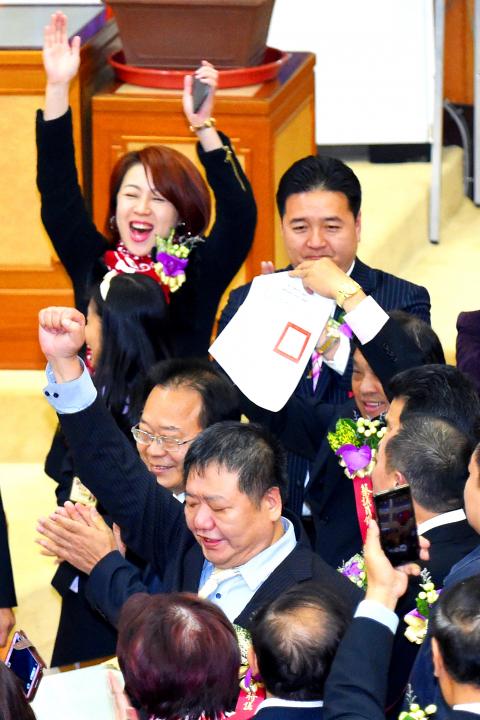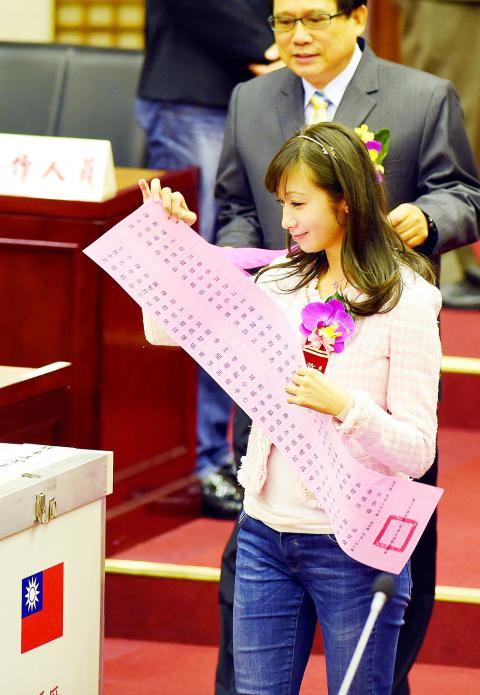On the day of the inauguration of newly elected city, municipality and county heads, 22 councils across the country also voted to choose speakers and deputy speakers.
While the Democratic Progressive Party (DPP) secured the speakers of the Greater Kaohsiung, Yilan County and Chiayi County councils, the Chinese Nationalist Party (KMT) picked up 15, with the remaining four — Hsinchu City, Lienchiang County, Pingtung County and Chiayi City — won by independent councilors.
The Taipei City Council, where the KMT has 28 of the 63 seats and the DPP has 27, is to be presided over by the KMT after the party’s candidate had won by 32 votes to 31 for the DPP’s candidate, while the KMT’s deputy speaker candidate garnered 32 votes to the DPP’s 28.

Photo: Liu Hsin-de, Taipei Times
The New Taipei City Council, which the pan-green camp had expected to win after the DPP threatened to strip the membership of those who did not vote with the party line after 65 years of KMT rule, failed to witness a “color conversion.”
While the DPP has more seats (32) on the New Taipei City Council than the KMT (26), there are seven councilors with no party allegiance and one Taiwan Solidarity Union (TSU) councilor. With TSU Councilor Chang Chin-ting (張晉婷) and a non-affiliated councilor, Chen Shih-rong (陳世榮), being former DPP members, the pan-green camp had expected to have the upper hand in the ballot.
Two rounds of votes, both resulting in a 33-33 tie, were undertaken, before the council finally drew lots, with luck on the side of KMT council speaker candidate Chiang Ken-huang (蔣根煌).

Photo: Liao Chen-huei, Taipei Times
The tie, assuming that all of the DPP councilors toed the party line, indicated that one of the two non-DPP pan-green councilors had not voted as expected.
Chang was rumored to have been the culprit, speculation echoed by DPP Legislator Wu Ping-jui (吳秉叡) and DPP Councilor Liao Hsiao-ching (廖筱清), who directly attributed the loss to the TSU.
The TSU later released a statement saying that the TSU and the DPP had reached a consensus before the vote that the two parties would work together and require their respective party members to toe the party line.
“Following rumors that some [councilors] failed to vote in accordance with party policy, the TSU is to immediately initiate an investigation with the DPP to identify the councilors who breached the agreement and punish them by revoking their party membership,” it said.
Fuming over the outcome of the Tainan City Council vote, the DPP also announced that those who had failed to vote for the party’s own candidates would be severely punished.
To many people’s surprise, the Tainan City Council, where the DPP has a 29-16 advantage over the KMT in terms of seats, selected KMT Councilor Lee Chuan-chiao (李全教) as council speaker, after Lee secured 29 votes to DPP councilor Lai Mei-hui’s (賴美惠) 26.
The DPP said it had expected at least 31 votes, so at least five councilors had not voted as agreed.
DPP Central Review Committee chairman Liu Shih-fang (劉世芳) said that as the party had required all party members to “show their ballots” before putting them in the ballot box as a way to demonstrate their adherence to the party line, “those who failed to do so are seen as the ones who had voted against the party’s candidate and they will face disciplinary action.”
While failing to achieve the expected wins in New Taipei City and Greater Tainan, the DPP did make gains in Greater Kaohsiung and Yilan County, where the party had its speaker candidates elected for the first time in history.
Police installed six surveillance cameras in the Kaohsiung council chamber to monitor the vote and said that those exposing their ballots would be investigated.

Tropical Storm Gaemi strengthened into a typhoon at 2pm yesterday, and could make landfall in Yilan County tomorrow, the Central Weather Administration (CWA) said yesterday. The agency was scheduled to issue a sea warning at 11:30pm yesterday, and could issue a land warning later today. Gaemi was moving north-northwest at 4kph, carrying maximum sustained winds near its center of up to 118.8kph and gusts of 154.8kph. The circumference is forecast to reach eastern Taiwan tomorrow morning, with the center making landfall in Yilan County later that night before departing from the north coast, CWA weather forecaster Kuan Shin-ping (官欣平) said yesterday. Uncertainty remains and

SEA WARNING LIKELY: The storm, named Gaemi, could become a moderate typhoon on Wednesday or Thursday, with the Taipei City Government preparing for flooding A tropical depression east of the Philippines developed into a tropical storm named Gaemi at 2pm yesterday, and was moving toward eastern Taiwan, the Central Weather Administration (CWA) said. Gaemi could begin to affect Taiwan proper on Tuesday, lasting until Friday, and could develop into a moderate typhoon on Wednesday or Thursday, it said. A sea warning for Gaemi could be issued as early as Tuesday morning, it added. Gaemi, the third tropical storm in the Pacific Ocean this typhoon season, is projected to begin moving northwest today, and be closest to Taiwan on Wednesday or Thursday, the agency said. Today, there would likely

DISRUPTIONS: The high-speed rail is to operate as normal, while several airlines either canceled flights or announced early departures or late arrivals Schools and offices in 15 cities and counties are to be closed today due to Typhoon Gaemi, local governments announced last night. The 15 are: Taipei, New Taipei City, Taoyuan, Tainan, Keelung, Hsinchu and Kaohsiung, as well as Yilan, Hualien, Hsinchu, Miaoli, Chiayi, Pingtung, Penghu and Lienchiang counties. People should brace for torrential rainfall brought by the storm, with its center forecast to make landfall on the east coast between tonight and tomorrow morning, the Central Weather Administration (CWA) said. The agency issued a sea warning for the typhoon at 11:30pm on Monday, followed by a land warning at 11:30am yesterday. As of

CASUALTY: A 70-year-old woman was killed by a falling tree in Kaohsiung as the premier warned all government agencies to remain on high alert for the next 24 hours Schools and offices nationwide are to be closed for a second day today as Typhoon Gaemi crosses over the nation, bringing torrential rain and whipping winds. Gaemi was forecast to make landfall late last night. From Tuesday night, its outer band brought substantial rainfall and strong winds to the nation. As of 6:15pm last night, the typhoon’s center was 20km southeast of Hualien County, Central Weather Administration (CWA) data showed. It was moving at 19kph and had a radius of 250km. As of 3pm yesterday, one woman had died, while 58 people were injured, the Central Emergency Operation Center said. The 70-year-old